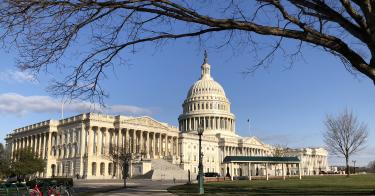It’s budget season in Washington, and President Trump just fired the opening shot.
The president’s plan puts the federal budget on a path to balance over 15 years by reining in wasteful government spending while keeping taxes low and America’s national defense strong.
It continues pro-growth policies, while making progress on reducing the federal government’s footprint and returning power to the people and their states and localities to handle programs that are more local in nature. That’s a promising path to not only save taxpayer money, but ensure program recipients get better service.
Regretfully, Congress seems uninterested in adopting better fiscal policy.
The Constitution bestows the power of the federal purse on Congress. It is ultimately up to the legislature to pursue a budget resolution, pass it in both the House and Senate, and then create legislation to implement the congressional budget’s goals.
The responsible congressional committees, however, have other ideas.
According to Senate Budget Chairman Mike Enzi, R-Wyo.: “Nobody has listened to the president in the 23 years that I've been here … Congress doesn't pay attention to the president's budget exercise. I don't know why we put him through that.”
>>>Trump Budget Cuts Size of Federal Government, but Bolder Reforms Needed
Meanwhile, House Budget Chairman John Yarmuth, D-Ky., who should be leading off the congressional budget resolution process, has already announced that Congress is “unlikely” to produce a budget this year.
What happened to transparency and accountability? The president putting out his budget enables the American people to see how his policies would affect the debt and the economy. Americans deserve to know what politicians’ proposals will cost them.
In Trump’s case, the budget would extend the individual tax cuts that are set to expire in 2025, preventing large tax increases on most Americans. Nine out of 10 Americans saw their taxes go down in 2018, with an average reduction of $2,900 in the tax burden for a family of four.
On health care, one of the biggest budget items that is also projected to grow the most, Trump builds upon current administrative actions and lays out additional reforms. His budget recognizes the importance of instituting changes that will improve the management and oversight of the Medicare and Medicaid programs.
Among the changes are strengthening competition and increasing physician independence while expanding choices and lowering costs for Medicare patients. In Medicaid, the budget provides states with additional flexibility to care for those with mental illnesses, ensuring only those eligible are enrolled, and extending work requirements for welfare—to continue to help Americans move up and out of poverty.
There are also some areas of concern, where the administration should reconsider current proposals.
These include reducing the number of years undergraduate students must pay off their student loans from 20 years to 15 years, after which the remaining balance would be “forgiven”—read: paid for by taxpayers. Instead, the budget should protect taxpayers from being on the hook for other people’s debts.
The budget also proposes more spending to help states set up paid family and medical leave programs and for infrastructure projects. Both of these should be left to states and localities and the private sector, without unnecessary and troubling federal funding and regulatory encroachment.
Another major misstep is the proposed $5 billion Education Freedom Scholarships. The administration’s support of school choice is praiseworthy, but a federal tax credit scholarship program poses a threat to education choice in the states and would likely subject private schools to future regulations from an administration and Congress less friendly to education choice.
Progressive politicians, meanwhile, have put forth proposals that could double or triple the amount of federal spending, while their tax proposals are limited in scope to collecting more from the so-called rich. Yet their exorbitant plans would most likely necessitate higher taxes on middle- and lower-income Americans. A European-style welfare state comes at a high cost to working families.
Without congressional Democrats in charge of the House budget committee putting those plans on paper, including their fiscal cost as part of a budget resolution that reflects their priorities, taxpayers are left in the dark about the stark choices they face.
Perhaps Congress needs some extra motivation. Proposals like Sen. Mike Braun’s No-Budget-No-Pay bill might help focus lawmakers on getting their No. 1 job done.
Trump is once again leading the way on the budget. It’s now time for Congress to do its part.
This piece originally appeared in The Detroit News



